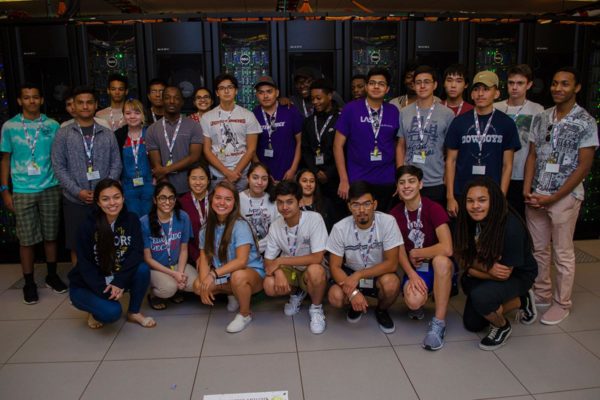Gabriela Gonzalez, a senior at United High School in Laredo, Texas, said she never thought she’d be interested in coding, mostly because she was worried it would be too difficult to learn. But Gonzalez was fascinated by the impact of computers in our lives, so she took a leap and decided to attend Code@TACC — a set of mostly free summer camps for high school students hosted by The University of Texas at Austin’s Texas Advanced Computing Center (TACC).
Gonzalez was one of 100 students who came from across Texas — some from as far as 350 miles away — to learn coding at UT’s J.J. Pickle Research Campus. They stayed on campus for up to a week while they attended camps led by some of the best computer scientists and engineers in the world — most at no cost to them.
TACC hosted four camps this summer, each focusing on a unique computing specialty — robotics; wearables (the only camp that charged a fee); cybersecurity; and “connected,” a new program offered this year in which students become citizen scientists and use technology to solve problems that are important to them.
That was the focus of Code@TACC Connected, which taught students how to use sensors and computers to observe, measure and understand the world around them. The camp encouraged them to design their own experiments and apply their findings to actual issues affecting their communities.

For example, students gained an understanding of temperature and humidity and then brought the concepts together to find a correlation for heat index and the amount of greenhouse gasses in the air.
They did this by working in teams to build environmental sensor modules and deploying them around the Pickle Research Campus to collect environmental data.
Gonzalez, who participated in the Code@TACC Connected camp, says that the camp’s focus on real-world problem solving made coding more grounded and accessible.
“Through this camp I’ve learned that actual data is much easier to comprehend and use rather than making assumptions. Numbers allow you to understand what is true and what is not true,” Gonzalez says.
Code@TACC Connected was created thanks in part to funding from Planet Texas 2050, UT’s first grand challenge that has brought together more than 100 researchers from disciplines across campus to find ways to make Texas resilient in the face of climate extremes and rapid population growth.
As part of the camp, the students visited Waller Creek, an Austin-area waterway that begins north of UT Austin’s main campus and meanders through downtown, flowing into Lady Bird Lake, and for many years has been subject to severe flooding. Waller Creek represents a micro example of what happens when natural watersheds become more urbanized.

“Here at the university, Waller Creek is a primary point of interest for scientists,” said Suzanne Pierce, a research scientist at TACC and an organizing committee member of Planet Texas 2050. “The very same environmental sensors that we used for the summer camp can also be used for Waller Creek, and the lessons learned can be transferred to Planet Texas 2050.”
“We’re very excited to have our signature Code@TACC program be selected as an avenue to disseminate these important efforts that the university is leading,” says Rosalia Gomez, TACC’s education and outreach manager.
“I hope students came out of the camp learning that the landscape around them is not passive … that they can interact and observe the world more deeply.”
After attending Code@TACC Connected, Gonzalez said that UT Austin is one of her top school choices, and she now plans to study civil engineering and computer science.
The Summer 2018 Code@TACC camps were supported by the National Science Foundation, KLE Foundation, Summer STEM Investment Hub, Planet Texas 2050, Cisco, and Dell EMC.




